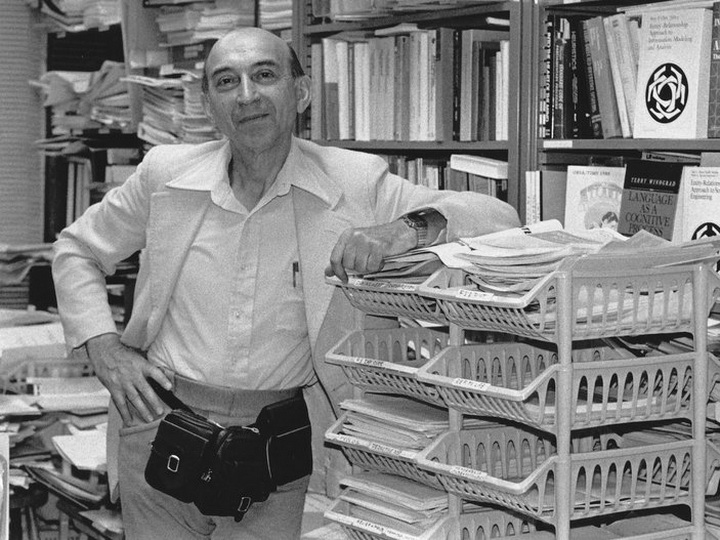NY Times: Lotfi Zadeh, Father of Mathematical ‘Fuzzy Logic,’ Dies at 96

By CADE METZ
Lotfi Zadeh, the computer scientist and electrical engineer whose theories of “fuzzy logic” rippled across academia and industry, influencing everything from linguistics, economics and medicine to air-conditioners, vacuum cleaners and rice cookers, died on Wednesday at his home in Berkeley, Calif. He was 96.
His son, Norman, confirmed the death.
Emerging from an academic paper Mr. Zadeh published in 1965 as a professor at the University of California, Berkeley, “fuzzy logic,” as he called it, was an ambitious effort to close the gap between mathematics and the intuitive way that humans talk, think and interact with the world.
If someone asks you to identify “a very tall man,” for instance, you can easily do so — even if you are not given a specific height. Similarly, you can balance a broom handle on your finger without calculating how far it can lean in one direction without toppling over.
Mr. Zadeh envisioned a mathematical framework that could mimic these human talents — that could deal with ambiguity and uncertainty in similar ways. Rather than creating strict boundaries for real world concepts, he made the boundaries “fuzzy.” Something was not in or out, for example. It sat somewhere on the continuum between in and out, and at any given moment a set of more complex rules defined inclusion.
“It was a bridge between theory and reality,” said Rudolf Seising, a professor at the University of Jena in Germany who specializes in fuzzy logic and worked alongside Professor Zadeh in his later years.
In academic circles, Professor Zadeh’s work was controversial and sometimes ridiculed, in part because it challenged other forms of mathematics and in part because of his terminology. “Fuzzy logic” seemed to make fun of itself.
But the logic itself was not fuzzy, said Professor Timothy Ross of the University of New Mexico. It was a way of dealing with “fuzzy sets,” collections of information whose boundaries were vague or imprecise. Over the years it proved to be an enormously influential idea.
According to the website Google Scholar, Mr. Zadeh’s 1965 paper, titled “Fuzzy Sets,” has been cited by more than 90,000 scholarly works, and his mathematical concepts have provided practical new ways to build consumer electronics, trade stocks, forecast weather and more.
Lotfi Asker Zadeh was born on Feb. 4, 1921, in Baku, Azerbaijan, which was then a part of the Soviet Union. His father was a journalist, and his mother, born in Russia, was a doctor.
After the family moved across the Soviet border to Iran, Mr. Zadeh graduated with a science degree from the University of Tehran. During World War II he sold goods to the American Army, earning enough money to continue his education in the United States, his son said. He received a master’s degree in electrical engineering from the Massachusetts Institute of Technology in 1946 and a Ph.D. from Columbia in 1949.
.PNG)
As a professor at Columbia, working alongside John Ragazzini, Mr. Zadeh developed a mathematical method called z-transformations, which became a standard means of processing digital signals inside computers and other equipment. He moved to Berkeley in 1959.
Elijah Polak, a professor emeritus at Berkeley, recalled in an interview that Professor Zadeh’s theory of fuzzy sets emerged during their walks across the campus. Professor Zadeh began noticing that when people parked their cars, they would intuitively turn their wheels slightly to the left and then slightly to the right before pulling into a parking space.
“But how much is slightly?” he would ask.
Fuzzy sets began as an effort to use mathematics to define “slightly” — or “tall” or “fast” or “beautiful” or any other concept that has ambiguous boundaries.
Professor Zadeh originally envisioned fuzzy sets as simply a framework for harnessing language. But the idea expanded into other areas. It could provide a way for insurance companies to assess damage after an earthquake, for instance. Is the damage serious, moderate or minimal under company rules? Fuzzy sets could help.
“They opened up a whole new way of addressing problems where you don’t have precise data,” said Professor Ross, the author of a textbook on the practical uses of fuzzy logic.
The method could also help build machinery and electronics that gradually move from one state to another, like an automobile transmission, which shifts smoothly from first gear to second, or a thermostat, which flows just as smoothly from hot to cold. Hot and cold need not be precisely defined. They could exist on a continuum.
In the 1980s, Professor Zadeh’s ideas became popular among Japanese manufacturers, thanks to heavy investment from the government. Today the hype has faded, but fuzzy logic remains an active part of the mathematics that underpin the modern world.
In recognition of his work, Professor Zadeh received more than 50 engineering and academic awards. From 1963 to 1968 he was chairman of Berkeley’s electrical engineering department, helping to shift its focus toward computer science, a move that gave rise to one of the world’s top university computer science programs.
Professor Zadeh’s son is his only immediate survivor. His wife, Fania, died this year. A daughter, Stella, died in 2006. He was to be buried in Baku.
Professor Zadeh and others saw fuzzy logic as a tool for eventually building true artificial intelligence, and though many academics, including some Berkeley colleagues, questioned how effective these methods would be, he held firm.
“He always took criticism as a compliment,” said Stuart Russell, a Berkeley professor who worked next door to Mr. Zadeh for many years. “It meant that people were considering what he had to say.”














